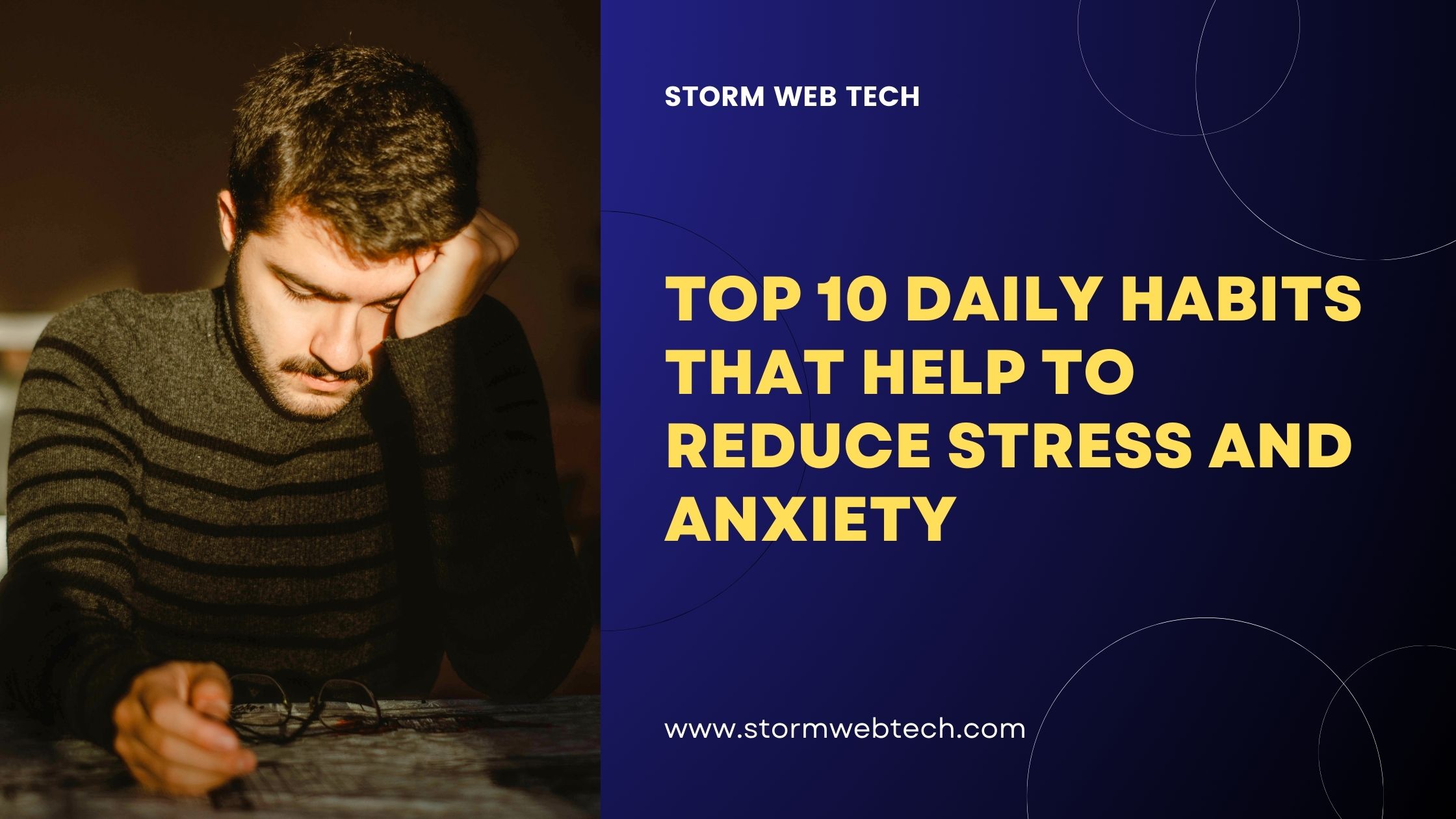In today’s fast-paced world, stress and anxiety have become prevalent challenges affecting people from all walks of life. The demands of work, family, and social obligations can take a toll on our mental well-being. Fortunately, adopting healthy daily habits can play a crucial role in managing and reducing stress and anxiety. In this blog post, we’ll explore the top 10 daily habits that help to reduce stress and anxiety, that can positively impact your mental health.
10 Daily Habits That Help to Reduce Stress and Anxiety
In today’s fast-paced and demanding world, stress and anxiety have become common experiences for many individuals. These emotions can range from mild to severe and can significantly impact our physical and mental well-being. While it’s impossible to eliminate stress entirely, there are many effective strategies we can adopt to manage it effectively and reduce its negative effects.
Incorporating healthy habits into our daily routine can make a profound difference in alleviating stress and anxiety. These habits, when practiced consistently, can help us cultivate a sense of calm, enhance our resilience, and promote overall well-being.
Here are powerful 10 daily habits that help to reduce stress and anxiety :
Morning Meditation
Start your day with a few minutes of meditation to clear your mind and set a positive tone for the day. Meditation has been proven to reduce stress and promote overall well-being. Focus on your breath and let go of any tension or worries.
Regular Exercise
Physical activity is a powerful stress reliever. Incorporate at least 30 minutes of exercise into your daily routine. Whether it’s a brisk walk, a workout at the gym, or yoga, exercise releases endorphins, which are natural mood lifters.
Healthy Eating
A balanced diet plays a significant role in mental health. Avoid excessive caffeine and sugar, as they can contribute to anxiety. Instead, opt for nutritious meals rich in fruits, vegetables, and whole grains, which provide essential nutrients for brain health.
Adequate Sleep
Quality sleep is crucial for stress management. Establish a consistent sleep routine, aiming for 7-9 hours of sleep each night. Create a comfortable sleep environment, limit screen time before bedtime, and avoid caffeine in the evening.
Mindfulness Practices
Incorporate mindfulness into your daily routine. Whether through mindful breathing, mindful walking, or mindfulness meditation, staying present in the moment can help reduce anxiety. Mindfulness encourages acceptance and non-judgmental awareness.
Digital Detox
Constant exposure to digital devices can contribute to stress. Take regular breaks from screens, especially social media. Set designated times for checking emails and messages to avoid feeling overwhelmed by constant connectivity.
Establishing Boundaries
Learn to say no and set boundaries to prevent overcommitting yourself. It’s essential to prioritize your well-being and not spread yourself too thin. Clear boundaries help create a healthier work-life balance.
Gratitude Journaling
Take a few minutes each day to reflect on the positive aspects of your life. Keeping a gratitude journal can shift your focus from stressors to the things you’re thankful for, fostering a more positive mindset.
Social Connections
Nurture relationships with friends and family. Social support is a powerful buffer against stress. Make time for meaningful connections, whether through in-person interactions or virtual communication.
Relaxation Techniques
Incorporate relaxation techniques such as deep breathing, progressive muscle relaxation, or guided imagery into your daily routine. These practices can help calm the nervous system and alleviate stress.
Remember, stress and anxiety are normal human emotions. However, if these emotions are interfering with your daily life, it is important to seek help. By incorporating these daily habits into your routine, you can effectively manage stress and anxiety and promote a sense of calm and well-being in your life.
In addition to the 10 daily habits mentioned above, here are a few additional tips for reducing stress and anxiety :
- Learn to say no. It’s okay to decline requests or invitations if you’re feeling overwhelmed.
- Set realistic expectations for yourself. Don’t try to be perfect.
- Take breaks throughout the day. Get up and move around for a few minutes every hour or so.
- Spend time in nature. Being outdoors can have a calming effect.
- Listen to calming music. Music can help to relax your mind and body.
- Create a relaxing bedtime routine. This will help you wind down and get a good night’s sleep.
- Find a hobby that you enjoy. Hobbies can help to reduce stress and provide a sense of relaxation.
- Learn to manage your finances. Financial stress can contribute to anxiety.
- Volunteer your time. Helping others can make you feel good about yourself and reduce stress.
By taking care of yourself both physically and mentally, you can effectively manage stress and anxiety and live a happier, healthier life.
Incorporating these top 10 daily habits into your routine can significantly contribute to reducing stress and anxiety. Remember, it’s essential to prioritize self-care and make your mental health a priority. Experiment with these habits and find the combination that works best for you. Consistency is key, and over time, you’ll likely experience the positive impact on your overall well-being.
Read More -:
- Traits of an Entrepreneur For Success
- Habits of Successful Students
- Habits Of Highly Effective People
- Habits to Become Mentally Strong
- Tips for a Successful Job Interview
- Habits of Unsuccessful People
- Habits That Are Killing Your Energy
- Ways to Reduce Stress in Your Life
- Habits of Successful Salespeople
- Morning Habits of Highly Successful People
- Morning Habits That Will Change Your Life
- Lessons From The Bhagavad Gita
- Life-Changing Lessons From The Alchemist
